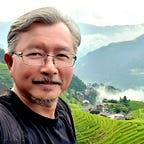Simplicity
Day Thirty One
When I graduated from university over thirty-two years ago, I registered a sole proprietorship called “Dasein Studio”, a pun for design studio, to design and edit publications. It sustained me for a year as an entrepreneur wannabe trying to pay tuition loans and give a little allowance to my parents before I went into seminary and pursue non-profit work.
“Dasein” was inspired by Martin Heidegger’s philosophical reflections on what is it to exist as a being in time. This German word was a reminder and a signpost for my lifelong anthropological pursuit towards authenticity, to become a more authentic human being, a phrase which is becoming popular these days as it is bandied about by the young people.
Actually Heidegger’s book is a difficult one to read and digest even for philosophy students, as he wrote in a convoluted way as most German scholars did, to explore speculative and complex ideas. However the biographical sketch of the man, especially his journeys into the Black Forest, in the Rhineland and live among the villagers in the mountain, sitting and sharing a smoke with the peasants and watching the sunset together, persuaded me that there is a glimpse of humanity behind the sophistication in writings and thought. The appeal of humanity is sometimes quite simple. It is evidenced in simplicity.
Years later, I discovered the writings of Lin Yutang who introduced me to the thoughts of Chinese thinkers from Confucius to Laozi and Zhuangzi. Yu Qiuyu, who was a doyen of Chinese cultural practitioners and thinkers, was another who could translate classical Chinese writings into simple practical ideas for contemporary readers. He is like the curator of a museum full of precious antiques and treasures but able to make them come alive with interest. A natural teacher of truth who can communicate and make the profound simple.
Years ago, I spent three months at a local Chinese chamber of commerce night school after work, learning advanced Chinese language and literature to recover my Chinese literary interests after I had laid it aside after passing the exams for my GCE “A” levels. The lady teacher who was a China mainlander introduced the small class to the writings of 20th century China, ranging from Laoshe to Qian Zhongshu. But the greatest impact she had on me was that she brought the writings of Lu Xun to life.
Lu Xun was a revolutionary, not only because he chose to write in vernacular Chinese language rather than classical Chinese ( the language of Chinese scholars for centuries) to prove the point that simplicity can be profound too. Most importantly, it makes learning and thought accessible to his countrymen in an age when classical education was limited to a handful.
His literary revolution had political and social implications as he was like the Father of Republican China Dr Sun Yatsen, seeking to awaken the consciousness of the world’s most populous nation to the possibility of living in freedom and dignity, beyond being mere scavengers for food and shelter. Both were medical students converted to the cause of healing the soul of the nation rather than merely attending to the declining physical health. They aspired to build a nation who would no longer be content to be the Sick Man of East Asia nor a mere factory for the world.
Confucius gave us a vision of the authentic human being as Junzi, (translated as “Gentleman”), a person who pursues self-cultivation, who is schooled in the arts and sciences, and most importantly, skilled in relationships. The Junzi has the ability to relate well with human beings from all walks of life, from princes to peasants, from sovereigns to subjects, from children to the seniors. To see each other as a person and respect one another as a human being is the most important art of living, which Lin Yutang, Lu Xun, and Yu Qiuyu will agree with.
Being human and becoming human. Heidegger could nod his head on this too, as he sits with his friends on the mountain, takes a puff on his pipe and blows up the smoke into the setting sun across the river Rhine. Simply profound and profoundly simple.
Journey with me over 40 days as we reflect on life and hope in the wilderness
See previous day’s reflection on Yellow Earth. See next reflection on Changes
